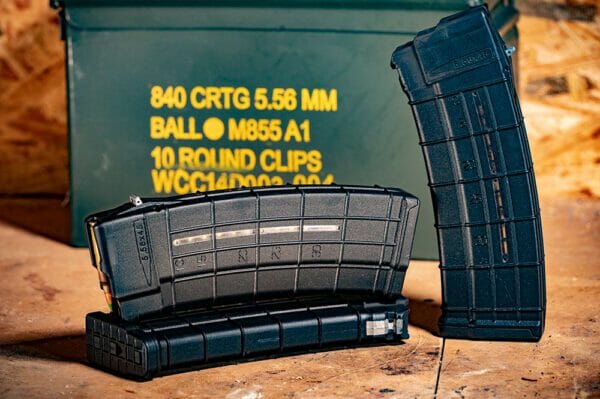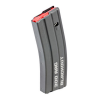
Democrats in the United States Senate recently introduced legislation to prohibit high-capacity ammunition magazines.
On March 7, 2025, Sen. Tim Kaine (D-VA), along with 21 other Senators, introduced The Keep Americans Safe Act.
The bill seeks to prohibit the importation, sale, manufacturing, transfer, or possession of gun magazines that can hold more than 10 rounds of ammunition. Additionally, the bill would modify the high-capacity definition to prevent coupled or joined magazines while also authorizing a buyback program for high-capacity magazines.
“Bans on semiautomatic weapons save lives—proven by the previous ban that lowered death rates of mass shootings by 70 percent. The expiration of this ban, and the continued refusal by many of my Republican colleagues to reinstate it, is leading to preventable tragedies across our nation,” stated Kaine. “I’m proud to introduce this commonsense legislation that will once again put in place this essential safeguard to make Virginia and our nation a safer place for all.”
The bill has received support from the usual anti-gun suspects such as Brady, Giffords, Everytown, and March for Our Lives. High-capacity magazine bans are one of the proposals at the top of the gun control crowd’s wish list.
Live Inventory Price Checker
| Hexmag 5.56x45 Carbon Fiber 30 Round AR-15 Magazine With Red Follower, Dark Gray - HX30-AR15S2-CFC | Palmetto State Armory | $ 16.79 | ||
 |
Ruger AR-556 .300 Blackout 30 Round AR-15 Magazine, Black - 90526 | Palmetto State Armory | $ 21.99 $ 17.19 | |
 |
Lancer Systems L5AWM 30-Round AR-15 Magazine - 5.56 NATO - Black | Primary Arms | $ 16.99 | |
| Ruger AR-556 .300 Blackout 30 Round AR-15 Magazine, Black - 90526 | Palmetto State Armory | $ 24.99 $ 17.99 |
For Second Amendment activists, such magazine capacity limits infringe on the right to bear arms. Pro-gun organizations such as the National Shooting Sports Foundation (NSSF) argue that magazines holding over 10 rounds are in “common use,” thereby safeguarded by the Second Amendment. Per an NSSF study published last year, roughly 717 million magazines of this nature are in circulation across the country.
On top of that, like other forms of gun control, criminals will ignore a hypothetical high-capacity magazine ban. This will put law-abiding citizens at a disadvantage against criminals willing to inflict harm regardless of what laws are on the books. In their obsession with banning high-capacity magazines, gun controllers ignore that mass shooters often carry multiple firearms, rendering magazine capacity limits ineffective.
Similarly, criminals can also turn to using multiple assailants to carry out their dastardly deeds. The San Bernardino shootings of 2015 saw two gunmen kill 14 people in cold blood. Magazine limits would do nothing to mitigate, much less prevent these incidents.
Arguments against magazine bans are not hypothetical dismissals of public policy. These bans were national policy decades prior and proved to be ineffective. The United States already had an assault weapons ban on the books from 1994 to 2004. The 1994 assault weapons ban was part of the Violent Crime Control and Law Enforcement Act of 1994, which was signed by then-president Bill Clinton on Sept. 13, 1994.
During the era of the Clinton “assault weapons” ban, high-capacity magazines and so-called “assault weapons” were banned. Anti-gun Democrats have long tried to resurrect this legislation, with no success thus far. Nevertheless, Democrats keep boasting about this legislation’s reported effectiveness in stopping crime.
However, pro-gun investigators have argued that the 1994 assault weapons ban has not had much of an impact on crime. One example is research from pro-gun economist John Lott that found, “there was no drop in the number of attacks with assault weapons during the 1994 to 2004 ban. There was an increase after the ban sunset, but the change is not statistically significant.”
Even non-partisan studies by Congress found that the Clinton ban did not have an effect on crime, in part due to“the banned guns were never used in more than a modest fraction of gun murders.”
Despite this evidence, gun controllers are adamant about passing such bans. At the end of the day, gun control proponents don’t care about the abundance of evidence showing their proposals don’t work. What they really desire is controlling people’s ability to defend themselves, consequences be damned.
About José Niño
José Niño is a freelance writer based in Austin, Texas. You can contact him via Facebook and X/Twitter. Subscribe to his Substack newsletter by visiting “Jose Nino Unfiltered” on Substack.com.

from https://ift.tt/LgrE9Rx
via IFTTT

No comments:
Post a Comment